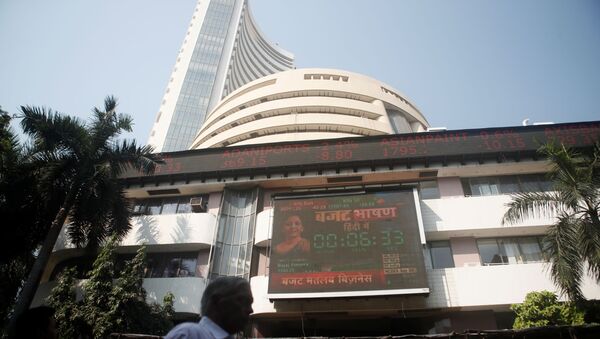Leading share markets in India experienced a sharp dip in early trading on Saturday, with most sectoral indices on the Bombay Stock Exchange (BSE) in the red.
The BSE market benchmark Sensex was down by 140 points at 40,576 in the opening session with power and metal indices falling over one percent each. Other indices such as realty, capital goods, fast moving consumer goods (FMCG), and industrials experienced small gains. The National Stock Exchange’s (NSE’s) Nifty index was also down by 126.50 points at 11,910 in early trading.
Netizens gave mixed reactions to the drop in share prices, with some advising others to wait for the budget proposals for fiscal year 2020-21 to be announced later in the day and others resigned to the economy not getting the required boost.
Insider trading
— Issa Mourad (@Issa_mourad_) February 1, 2020
They'll shoot it after budget lol
Just seeing face of ugly FM markets crashed
— Avantika (@Avantik88456452) February 1, 2020
Imagine what will happen after budget!#NirmalaHataoDeshBachao
Is it the Silence before the Storm...
— Pankaj Thapliyal (@PankajT04765688) February 1, 2020
Or Starting Trend for the Day. https://t.co/ZNG72mYyPa
Almost all stocks in red zone. It'll shoot after budget announcement..
— MURLI pandey (@Murli98Pandey) February 1, 2020
Panic button will be pressed in the afternoon by FM. #Budget2020
— Cosmonaut (@soyuz100) February 1, 2020
N Hiranandani,CMD,Hiranandani Group: I've never seen a liquidity crisis as bad as it is today. No matter how good the budget is if the oil in the mechanism of the economy is not working, the economy can't move.If the oil comes back&we get boost of budget then we will see recovery pic.twitter.com/bZK69uS0gI
— ANI (@ANI) February 1, 2020
Finance Minister Nirmala Sitharaman will be presenting her second consecutive Union Budget at 11 a.m. local time.
When she presented her first budget as finance minister on 5 July 2019, share markets responded negatively to some of the proposals, such as imposing taxes on those buying back shares. Last year, in early morning trading, the BSE Sensex fell 0.98 percent and by two percent the day after the proposals.
India's nominal GDP growth rate was estimated at 12 percent in 2019-20, while the estimate for 2018-19 was 11.5 percent. India's foreign exchange reserves were pegged at $448.59 billion until the third week of November, according to data from the Reserve Bank of India (RBI), the country’s central bank. The growth rate was hovering between 3 and a little over 4 percent in the third quarter in comparison to the corresponding period in 2018-19.
The Washington-based International Monetary Fund (IMF) has already pointed out that the Indian economy experienced a slowdown in fiscal year 2019-20.
On Friday, IMF Managing Director Kristalina Georgieva urged the Indian government to revise growth projections along realistic lines to arrest the “ongoing and abrupt turbulence” in the economy.
She further stated that she remained optimistic about the economy making a turnaround in the mid-term and also praised some of the reforms initiated by the government such as demonetisation and introduction of a unified tax system. These steps though disruptive, would prove to be beneficial in the long term, Georgieva added.


